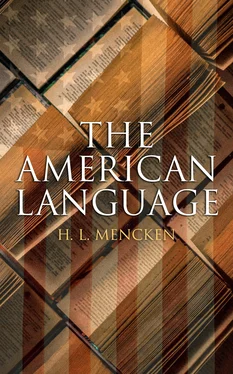This boldness of conceit, of course, makes for vulgarity. Unrestrained by any critical sense—and the critical sense of the professors counts for little, for they cry wolf too often—it flowers in such barbaric inventions as tasty , alright , no-account , pants , go-aheadativeness , tony , semi-occasional , to fellowship and to doxologize . Let it be admitted: American is not infrequently vulgar; the Americans, too, are vulgar (Bayard Taylor called them "Anglo-Saxons relapsed into semi-barbarism"); America itself is unutterably vulgar. But vulgarity, after all, means no more than a yielding to natural impulses in the face of conventional inhibitions, and that yielding to natural impulses is at the heart of all healthy language-making. The history of English, like the history of American and every other living tongue, is a history of vulgarisms that, by their accurate meeting of real needs, have forced their way into sound usage, and even into the lifeless catalogues of the grammarians. The colonial pedants denounced to advocate as bitterly as they ever denounced to compromit or to happify , and all the English authorities gave them aid, but it forced itself into the American language despite them, and today it is even accepted as English and has got into the Oxford Dictionary. To donate , so late as 1870, was dismissed by Richard Grant White as ignorant and abominable and to this day the English will have none of it, but there is not an American dictionary that doesn't accept it, and surely no American writer would hesitate to use it. 54 Reliable , gubernatorial , standpoint and scientist have survived opposition of equal ferocity. The last-named was coined by William Whewell, an Englishman, in 1840, but was first adopted in America. Despite the fact that Fitzedward Hall and other eminent philologists used it and defended it, it aroused almost incredible opposition in England. So recently as 1890 it was denounced by the London Daily News as "an ignoble Americanism," and according to William Archer it was finally accepted by the English only "at the point of the bayonet." 55
The purist performs a useful office in enforcing a certain logical regularity upon the process, and in our own case the omnipresent example of the greater conservatism of the English corrects our native tendency to go too fast, but the process itself is as inexorable in its workings as the precession of the equinoxes, and if we yield to it more eagerly than the English it is only a proof, perhaps, that the future of what was once the Anglo-Saxon tongue lies on this side of the water. "The story of English grammar," says Murison, "is a story of simplification, of dispensing with grammatical forms." 56And of the most copious and persistent enlargement of vocabulary and mutation of idiom ever recorded, perhaps, by descriptive philology. English now has the brakes on, but American continues to leap in the dark, and the prodigality of its movement is all the indication that is needed of its intrinsic health, its capacity to meet the ever-changing needs of a restless and iconoclastic people, constantly fluent in racial composition, and disdainful of hampering traditions. "Language," says Sayce, "is no artificial product, contained in books and dictionaries and governed by the strict rules of impersonal grammarians. It is the living expression of the mind and spirit of a people, ever changing and shifting, whose sole standard of correctness is custom and the common usage of the community.... The first lesson to be learned is that there is no intrinsic right or wrong in the use of language, no fixed rules such as are the delight of the teacher of Latin prose. What is right now will be wrong hereafter, what language rejected yesterday she accepts today." 57
§ 6
The Materials of American
Table of Contents
—One familiar with the habits of pedagogues need not be told that, in their grudging discussions of American, they have spent most of their energies upon vain attempts to classify its materials. White and Lounsbury, as I have shown, carried the business to the limits of the preposterous; when they had finished identifying and cataloguing Americanisms there were no more Americanisms left to study. The ladies and gentlemen of the American Dialect Society, though praiseworthy for their somewhat deliberate industry, fall into a similar fault, for they are so eager to establish minute dialectic variations that they forget the general language almost altogether.
Among investigators of less learning there is a more spacious view of the problem, and the labored categories of White and Lounsbury are much extended. Pickering, the first to attempt a list of Americanisms, rehearsed their origin under the following headings:
1 "We have formed some new words."
2 "To some old ones, that are still in use in England, we have affixed new significations."
3 "Others, which have long been obsolete in England, are still retained in common use among us."
Bartlett, in the second edition of his dictionary, dated 1859, increased these classes to nine;
1 Archaisms, i. e., old English words, obsolete, or nearly so, in England, but retained in use in this country.
2 English words used in a different sense from what they are in England. These include many names of natural objects differently applied.
3 Words which have retained their original meaning in the United States, though not in England.
4 English provincialisms adopted into general use in America.
5 Newly coined words, which owe their origin to the productions or to the circumstances of the country.
6 Words borrowed from European languages, especially the French, Spanish, Dutch and German.
7 Indian words.
8 Negroisms.
9 Peculiarities of pronunciation.
Some time before this, but after the publication of Bartlett's first edition in 1848, William C. Fowler, professor of rhetoric at Amherst, devoted a brief chapter to "American Dialects" in his well-known work on English 58and in it one finds the following formidable classification of Americanisms:
1 Words borrowed from other languages.Indian, as Kennebec, Ohio, Tombigbee; sagamore, quahaug, succotash.Dutch, as boss, kruller, stoop.German, as spuke (?), sauerkraut.French, as bayou, cache, chute, crevasse, levee.Spanish, as calaboose, chapparal, hacienda, rancho, ranchero.Negro, as buckra.
2 Words "introduced from the necessity of our situation, in order to express new ideas."Words "connected with and flowing from our political institutions," as selectman, presidential, congressional, caucus, mass-meeting, lynch-law, help (for servants).Words "connected with our ecclesiastical institutions," as associational, consociational, to fellowship, to missionate. Words "connected with a new country," as lot, diggings, betterments, squatter.
3 Miscellaneous Americanisms.Words and phrases become obsolete in England, as talented, offset (for set-off), back and forth (for backward and forward).Old words and phrases "which are now merely provincial in England," as hub, whap (?), to wilt.Nouns formed from verbs by adding the French suffix -ment, as publishment, releasement, requirement.Forms of words "which fill the gap or vacancy between two words which are approved," as obligate (between oblige and obligation) and variate (between vary and variation)."Certain compound terms for which the English have different compounds," as bank-bill, (bank-note), book-store (book-seller's shop), bottom-land (interval land), clapboard (pale), sea-board (sea-shore), side-hill (hill-side)."Certain colloquial phrases, apparently idiomatic, and very expressive," as to cave in, to flare up, to flunk out, to fork over, to hold on, to let on, to stave off, to take on.Intensives, "often a matter of mere temporary fashion," as dreadful, mighty, plaguy, powerful."Certain verbs expressing one's state of mind, but partially or timidly," as to allot upon (for to count upon), to calculate, to expect (to think or believe), to guess, to reckon."Certain adjectives, expressing not only quality, but one's subjective feelings in regard to it," as clever, grand, green, likely, smart, ugly.Abridgments, as stage (for stage-coach), turnpike (for turnpike-road), spry (for sprightly), to conduct (for to conduct one's self)."Quaint or burlesque terms," as to tote, to yank; humbug, loafer, muss, plunder (for baggage), rock (for stone)."Low expressions, mostly political," as slangwhanger, loco foco, hunker; to get the hang of."Ungrammatical expressions, disapproved by all," as do don't, used to could, can't come it, Universal preacher (for Universalist), there's no two ways about it.
Читать дальше












